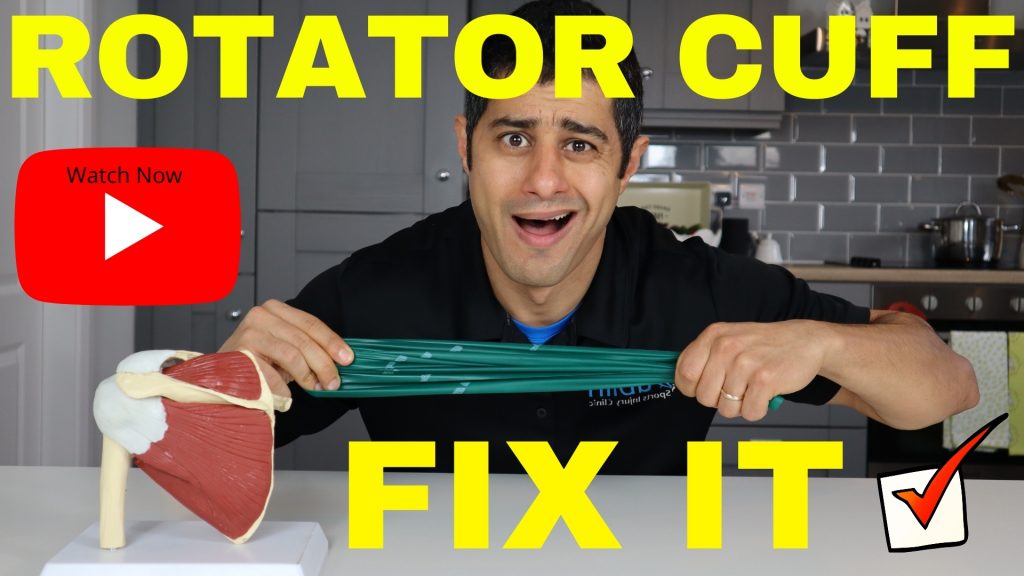Rotator Cuff Injury (Treatment & Management)
The rotator cuff is a group of tendons and muscles in the shoulder, connecting the upper arm (humerus) to the shoulder blade (scapula). The rotator cuff tendons provide stability (dynamic stability) to the shoulder and allow the shoulder to move in space.
The muscles in the rotator cuff include:
1- Teres minor external rotate the head of the humerus.
2- Infraspinatus externally rotate the head of the humerus.
3- Supraspinatus abduct the shoulder in The 1st to 15 degrees.
4- Subscapularis internally rotate the humerus.
Each muscle of the rotator cuff inserts at the scapula has a tendon that attaches to the humerus. Together, the tendons and other tissues form a cuff around the humerus.
During shoulder abduction, the rotator cuff muscles act together to stabilize the humeral head within the glenoid in a process known as concavity compression.
Cause
Rotator cuff injury can be caused by degenerative changes, repetitive microtraumas, severe traumatic injuries, traumatic injuries, and secondary dysfunctions.
In addition, Rotator cuff injury runs the full spectrum from injury to tendinopathy to partial tears, and finally complete tears. Age plays a significant role.
Injuries ranged from 9.7% in those 20 years and younger increasing to 62% in patients 80 years and older (whether or not symptoms were present) Read more.
Traumatic injury to the rotator cuff can be caused by falling on an outstretched hand, by an unexpected force when pushing or pulling, or during shoulder dislocation. Normal age-related muscle deterioration and excessive repetitive motions are examples of traumatic causes.
Few things to know about rotator cuffs pain / Injury:
1- Tight rotator cuff could refer pain to shoulder ac joint (Acromioclavicular Joint) it’s a common muscle with trigger points (nothing to be a worry about).
2- If you are working in an office and using your laptop or your phone daily you could develop a rounded shoulder which could lead you to the weak and tight rotator cuff and that would maximize the chance of having Trigger Points.
3- In addition, if you are working out in the gym it’s a great way to strengthen your rotator cuff muscles. Meanwhile, I have many clients who focus on the upper body especially the anterior chain (chest, shoulders, and arms ) and they could end up with rounded shoulders and a forward head.
As I always suggest to my patient that our body works like a chain, and if you having rounded shoulders you would have a higher chance of developing a forward head. In this case, your chances of rotator cuff injury will be increased.
Research has shown, with rounded shoulders our head of Humerus shift anteriorly superiorly (move forward and upward) which if you know shoulder anatomy the tendon of the long head of biceps and Supraspinatus pass through the head of Humerus into the shoulder’s capsule and if Humerus shift anteriorly and superiorly this structure could get pinched.
Treatment and Management
We strongly advise you to sick for medical advice from a qualified physical therapist before trying any of the exercises that we highlighted.
1- You may need to change your gym program (Cross-training) and modified your strengthening exercises with the help of your physical therapist.
2- Research has shown, customized strengthening exercises are a key element to your exercise rehabilitation. Read more
3- Adding some Mobility and flexibility exercises to your routine can improve your shoulder range of movement.
4- Recruiting your lower rhomboid and progress to strengthen in isolation.
5- In addition, we suggest to work on your thoracic spine mobility (Thoracic Rotation) as part of your routine.
Our Approach
Dublin Sports Injury Clinic is a physical therapy clinic based in Fitzwilliam Square, Dublin2. we have a holistic approach to our assessment and treatment. The initial assessment helps us to explore the cause of your injury and help you to get pain free shortly and stop any further injuries. We will design a customized training program for you to start with, and we coach you and monitor your progress closely. We will prescribe relative rest or modified activities as required. In addition, the patient’s education helps to reduce frustration and encourages compliance. In our clinic, the treatment of rotator cuff will be tailored to every individual.
Next step
Want to get in touch with our team of our therapist or you are looking for some advice? Simply fill in your details below & we get in touch with you shortly.
Disclaimer: This article is for information only and should not be used for the diagnosis or treatment of medical conditions. You can contact us if you would like to book an appointment or get some advice from our therapist.

